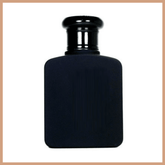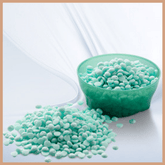How To Make A Homemade Exfoliating Scrub (with 3 simple ingredients!)
Exfoliating scrubs gently remove dull, dead skin cells and allow our smoother, glowing layers to shine through. In our post today, we’ll not only show you how quick and easy it is to make your very own body scrub but also the very best exfoliants and carrier oils we’d recommend plus additional recipes you’ll definitely want to make!

Not only is making your own body scrubs quick and easy, it’s also a cost-effective way to make your skin care routine affordable and it allows you complete control over what ingredients you add based on your own personal requirements.
Jump straight into our video tutorial below to make our Snapdragon & Patchouli Himalayan Salt Scrub and read on for a written tutorial as well as guidance and suggestions for creating your own bespoke formulations and what ingredients will allow you to tailor your products to suit your own skin care needs.
Please note: Our tutorial is designed for personal use only. You will need to follow all legal responsibilities before selling any products that come into contact with skin.
Our Snapdragon and Patchouli Exfoliating Salt Scrub is a great way to get started. Here's how to make it with just 3 simple ingredients...
Ingredients

- 300g of fine grade Himalayan salts
- 75g of coconut oil
- 11g of Snapdragon and Patchouli fragrance oil
Equipment

- A set of weighing scales
- Medium sized heat proof jug/container
- Smaller container for your fragrance oil
- A bowl to measure your salts
- A stirring implement
- A 300ml jar/container for your finished product
Step 1 – Weigh out your Ingredients

Making sure your work area is clean, weigh out 300g of Himalayan salts, 75g coconut oil and 11g of fragrance oil.
Step 2 – Melt Coconut Oil

Melt the coconut oil in the medium heatproof container. You can do this in the microwave on 10 second bursts or using the double boiler method on the stove. Be careful not to overheat.
Step 3 – Add Fragrance Oil

Add the fragrance oil to the melted coconut oil and stir until fully combined.
Step 4 – Add Salts

Now add the Himalayan salts to the oil mixture.

Stir continuously until every granule is coated in the oil.
Step 5 – Fill Your Container

Now add the mixture to your product container. Do not place the lid on until the oils have completely cooled.

Your body scrub can be used immediately!
How Much Oil Should I Use in My Exfoliating Scrub?
As we mentioned earlier you are able to tailor the recipe to suit your own skins needs. This may be by replacing the type of exfoliator or changing which oils you use. You can even combine different oils.
The general rule of thumb for working out the right scrub consistency when using salts or sugars is using the following method:
Salt/Sugar weight x 0.25 (or 25%) = weight of your oils or butters
For example, our recipe is 300g of salt x 0.25 = 75g of oils. The combined weight is 375g.
However, other types of exfoliants tend to be more absorbent, meaning you will likely need a higher oil to exfoliant ratio. See our recipes at the end of this post for ideas of how much oil to use depending on the exfoliant chosen and simply adjust depending on the consistency you're hoping for alongside your own personal skin care requirements.
What is an exfoliating scrub?

We often think of smooth, glowing skin as the job of a moisturizer or lotion and while moisturiser is incredibly important, we should not overlook the magic of an exfoliator.
Exfoliation, in cosmetic terms, is the process of removing dead skin cells from the body. There are two main types of exfoliations: chemical and physical. Chemical exfoliants use acids such as lactic acid and other AHA’s to break down dead skin.
Chemical exfoliants: Chemical exfoliants are best for the face as they are great for slowing the signs of aging, stimulating collagen, and revealing younger layers. Plus, certain physical exfoliants can be too harsh for the delicate skin of the face.
Physical exfoliants: Physical exfoliants, on the other hand, physically nudge, shift, and gently agitate the dead cells so they can be washed away.
Physical exfoliants (like the ones we will explore below) are best for the body as they are easy to apply to the whole body in the form of a shower scrub. Plus, areas like the knees, elbows, and feet can withstand (in fact, require) something with a little more grit.
An exfoliating scrub generally consists of an abrasive physical exfoliant and an emollient carrier such as natural butter or oil. Some scrubs are drier and have a damp sand-like texture while others are richer and oilier.
What are the benefits of exfoliation?

Stimulates blood flow: physical exfoliation stimulates blood to rush to the surface of the skin, delivering oxygen-rich and nutritious blood to those glowing layers. Plus, this boosts collagen production for a younger, plumper visage.
Softens skin: removing rough, dull dead skin allows smooth, soft layers to come to the fore. What’s more, the hydrating carriers (such as butters and oils) further soften and hydrate the skin.
Allows products to absorb more effectively: by removing those useless dead layers, products such as moisturisers, serums, and treatments can more easily penetrate the skin’s lower layers.
Helps to prevent breakouts: dead skin, when combined with sebum, can cause acne and general breakouts.
What are the best exfoliants for a body scrub?

Here are a few of our favourite exfoliants to try:
Raspberry Seed Exfoliant
Rubus Idaeus seeds, commonly known as raspberry seed is a soft and original exfoliant ideal for the care of fragile skin. It is gentler than ground shells, stones or salts and offers a light scent that will not interrupt any added fragrance or oils.
Pumice Powder Exfoliant
Naturally derived from volcanic ash, pumice powder is a natural exfoliant made up of light grey grains. It is ground, sifted and irradiated and contains no additives of preservatives.
Pumice powder is an excellent natural exfoliant in cosmetics. It is ideal for both cleansing and polishing your skin, leaving skin looking visibly healthier and refreshed. It also gives a stronger exfoliation compared to that of seeds or botanicals yet is still very gentle on the skin.
Apricot Stones Exfoliant
An excellent natural exfoliant, apricots stones are a coarse, granular powder that’s utilised in a variety of skin care products like soaps and scrubs to help remove dead skin. The natural scrubs still obtain oil that enhance the exfoliation experience.
Walnut Shells Exfoliant
Safe for the face and skin, walnut shells exfoliant is all natural and does a great job of removing dead skin cells to reveal a soft and radiant complexion. Best of all, the oils contained within will keep your skin moisturised and effectively enhance the exfoliation process.
Coffee Green Seed Exfoliant
Full of antioxidants, vitamins and nurtients, coffee green seed is an effective method of removing dead skin, creating a vitalised smooth new layer of skin.
Peach Stones Exfoliant
Finely ground peach stone gently exfoliates, removing dead skin cells as it polishes your skin for a smooth complexion. It leaves your skin feeling refreshed and naturally healthy-looking while containing natural oils that just improve the exfoliation process even further.
Almond (Sweet) Shells Exfoliant
A beautiful tan and light brown speckled powder, almond shells provide medium to aggressive abrasion when incorporated into exfoliating natural beauty and personal care products.
Poppy Seeds
Poppy seeds are an excellent natural exfoliant in cosmetics. They are ideal for both cleansing and polishing your skin, leaving skin looking visibly healthier and refreshed. They are an effective means of removing dead skin to bring you a revitalised smooth new layer of skin.
Sugar
Not only is sugar a great exfoliant, but it is also very cost-effective. The glycolic and alpha-hydroxyl acid in sugar assists to keep the skin well balanced and healthy. It won't become too dry or too oily so you will be left with a radiant glow.
Salts
Again, this cost-effective exfoliant will leave your skin with an excellent glow. Salt has anti-bacterial properties too, so it’s helpful for maintaining bacteria-free skin which helps to prevent any itchiness. We’ve used Himalayan salts in our recipe above but feel free to substitute this for normal table salt as a cost-saving option.
What are the best carrier oils for a body scrub?

You can use lots of different carrier oils in your body scrubs. Here are just a few of our favourites.
Coconut Refined Oil
Rich in antioxidants, Coconut Oil can help to prevent aging and damage to our skin and hair. It also has antibacterial and antifungal properties that help keep our skin healthy. Another quality of coconut oil is the fact that it contains Vitamin E and Vitamin A, which can contribute to anti-aging properties and reduce damage caused by free radicals and the sun.
Apricot Kernel Oil
With its fatty acid composition profile, Apricot Kernel Refined Oil is a Natural Refined Vegetable Oil that provides excellent emollient properties appreciated for all cosmetic formulations. It shows a minimal colour level and is virtually odourless, so it won’t interrupt your favourite scents if you choose to add fragrance or essential oils.
Almond (Sweet) Refined Oil
Almond (Sweet) Refined Oil is rich in proteins, Olein Glyceride Linoleic Acid, and Vitamin D, and is considered extremely nourishing to the skin through moisturization - particularly when used regularly. It’s a great carrier for soothing dry skin and irritated areas.
Rosehip Seed Refined Oil
A truly decadent oil, Rosehip Seed Refined Oil offers an excellent source of skin nourishing vitamins and essential fatty acids which are important for keeping the skin soft, smooth and radiant. Rosehips are known to have a vast vitamin C content, hence its popularity in formulations applied directly to the face & body.
Hemp Seed Cold Pressed Oil
Cold pressed, unrefined Hemp Seed Oil is dark to clear light green in colour, with a nutty flavour. Hemp seed oil is full of anti-inflammatory properties, contains Gamma-linoleic acid (GLA) and is rich in essential fatty acids Omega 3 &6.
Shea Unrefined Butter
Much loved for its healing properties, Shea Butter has been used as a cosmetic ingredient for centuries. Its high concentration of vitamins and fatty acids, combined with its super spreadable consistency make it a great product for smoothing, soothing and conditioning your skin.
Can I add fragrance to my body scrub?
Yes, you absolutely can add your own fragrances! As with the majority of wash off products, you can add up to 3% (of the weight in ingredients) of fragrance oil to your scrubs.
The most important thing to check is whether the oil you would like to use is skin safe. You can do this by checking the IFRA document which is available for download on each fragrance oil product listing - simply click the link that says 'IFRA 49th AMENDMENT'.
Once you've downloaded the IFRA document, under the heading that says, "Certificate of Conformity", you'll just want to check Category 9. If the IFRA documents shows the safe usage as being 3% or higher then you can use up to the full 3%. Please note, if the IFRA gives a percentage of more than 3%, we would still advise never using more than 3%.
As stated above, if using the formula of exfoliants weight x 0.25 (or 25%) = the amount of oil/butter, you can easily swap out which oils or exfoliants you use. You can also adjust these amounts to suit you, adding more exfoliant or even a little less. The great thing about making scrubs is that the making/method is so versatile, you will be able to make many variations of scrubs.
More Body Scrub Recipe Suggestions

Looking for more ideas for making your own body scrubs? Why not try one of these scrubbing marvellous ideas?
Gardener’s Scrub
250g Coffee Green Seed Exfoliant
75g Shea Butter
9.75 Amazon Rain Fragrance Oil
The coffee exfoliant will provide extra grit to remove soil from skin crevices and the shea butter will allow for a more solid moisturising consistency. Our Amazon Rain fragrance oils adds fresh ozonic and herbal notes for an additional fresh clean scent.
Facial scrub
150g Rosehip Seed oil
10.5g Pampering Bliss Fragrance Oil
Finely ground peach stone is one of the gentlest exfoliants so its kind to facial skin and the added rosehip oil is full of revitalising Vitamin C. Our Pampering Bliss fragrance oil will give you luxurious spa vibes with apricot, jasmine and vanilla notes. Adjust the Rosehip seed oil if you find the mixture is a bit too wet or dry, it's easily adjustable to suit your requirements.
Heel scrub
125g of Coconut Oil
11.25g Eucalyptus Fragrance Oil
The almond shell gives a good aggressive scrub to rid of any dead skin while the coconut oil has excellent antibacterial and anti-fungal properties, great for the feet. The addition of Eucalyptus fragrance oil provides a bright clean fragrance too.
If you’ve loved this post, you’ll also love our post on the best oils and butters to use for bath & body products. Be sure to check out our range of jars too for packaging your products effortlessly.








10 Comments
Hi in your video the coconut oil is in solid form and then melted. Is it ok to use a liquid form of coconut oil from the start ? If yes , do we mix at room temperature ?
If I used any of the other oils suggested do they need to be heated through at all or just mixed with salt at room temperature ?
Thanks in advance 🥰
Hi Kitsune, Yes, you would need to purchase an assessment for a body scrub before selling to the public. We do have these assessments coming over the coming months but they aren’t yet available so if you didn’t want to wait, you’d need to go to a 3rd party cosmetic assessor to have this completed for you based on your own recipe. Then you’d need to follow the legal guidelines set out in this post: https://craftovator.co.uk/blogs/academy/assessments-cosmetic-safety-reports-what-you-need-to-know-uk
Hope that helps!
Kimberly – Craftovator
Hey, this looks brilliant! Can you advise if there are any legal requirements for this like the soaps please?
Hi Carol, we’re pleased you love the suggestions here! The rosehip oil is particularly good for more mature skin but Apricot kernel oil, Almond oil, Jojoba oil and Hemp oil are all good to try too. Essentially, you’ll want to look for a light carrier oil and of course, you could experiment with mixing a few of these suggestions together to find what works best for your skin :) Hope that helps! Kimberly – Craftovator
Hi, thank you for the detailed information. I truly excitable to try making body & facial scrub to help my skin. Do you have information on which best oils or cream for mature skin? Kindest regards
Leave a comment
All blog comments are checked prior to publishing